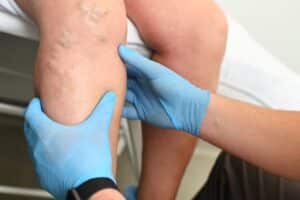
Chronic venous insufficiency (CVI) and blood clots are closely connected conditions that can significantly impact circulation and overall vascular health. When veins struggle to pump blood efficiently, it can lead to complications, including clot formation. Understanding how these conditions are related can help you take proactive steps to protect your vein health and prevent serious complications.
At Michigan Vein Care Specialists in Ann Arbor, MI, our team specializes in diagnosing and treating vein conditions, including chronic venous insufficiency and deep vein thrombosis (DVT). Dr. Suzanne Jones, a board-certified surgeon with expertise in Phlebology and over 20 years of experience, leads our practice, offering advanced, minimally invasive treatments tailored to individual patient needs.
What Is Chronic Venous Insufficiency?
CVI occurs when the veins in the legs fail to return blood efficiently to the heart, leading to pooling and increased pressure in the veins. Symptoms include:
- Leg swelling: Especially after prolonged sitting or standing.
- A feeling of heaviness or fatigue: A sensation of tired, aching legs.
- Skin discoloration or thickening: Changes around the ankles.
- Formation of varicose veins or spider veins: Visible, bulging veins in the legs..
If left untreated, CVI can increase the risk of blood clots, particularly deep vein thrombosis (DVT), a serious condition requiring immediate medical attention.
How Chronic Venous Insufficiency Leads to Blood Clots
Poor circulation due to CVI slows blood flow, creating an environment where clots can form more easily. Certain conditions and lifestyle factors may increase the likelihood of developing blood clots, such as:
- Prolonged standing or sitting: Limited movement affects circulation.
- Family history: A genetic predisposition to vein disease or clotting disorders.
- Pregnancy or hormone therapy use: Changes in blood flow and pressure.
- Obesity or excess weight: Added strain on veins.
- Smoking and lack of physical activity: Contributing factors to poor circulation.
Blood clots associated with CVI may develop as superficial thrombophlebitis (a clot in surface veins) or as deep vein thrombosis (DVT), which can travel to the lungs and cause life-threatening complications.
Treatment Options for CVI and Blood Clots
Managing CVI effectively can reduce the risk of clot formation and improve overall vein health. Depending on the severity of your condition, treatment options may include:
- Compression therapy: Wearing compression stockings to improve circulation and reduce swelling.
- Sclerotherapy: A minimally invasive procedure that closes off small, malfunctioning veins.
- Endovenous laser therapy (EVLT): A laser-based procedure used to treat larger varicose veins.
- Medication management: Blood thinners may be prescribed for individuals with a high risk of developing dangerous clots.
At Michigan Vein Care Specialists, we customize treatment plans based on each patient’s unique condition to provide lasting relief and prevent complications.
Take Control of Your Vein Health
If you are experiencing symptoms of chronic venous insufficiency or are concerned about blood clots, seeking expert care can help protect your health. Contact Michigan Vein Care Specialists at (734) 213-3700 to schedule a consultation and explore your treatment options.